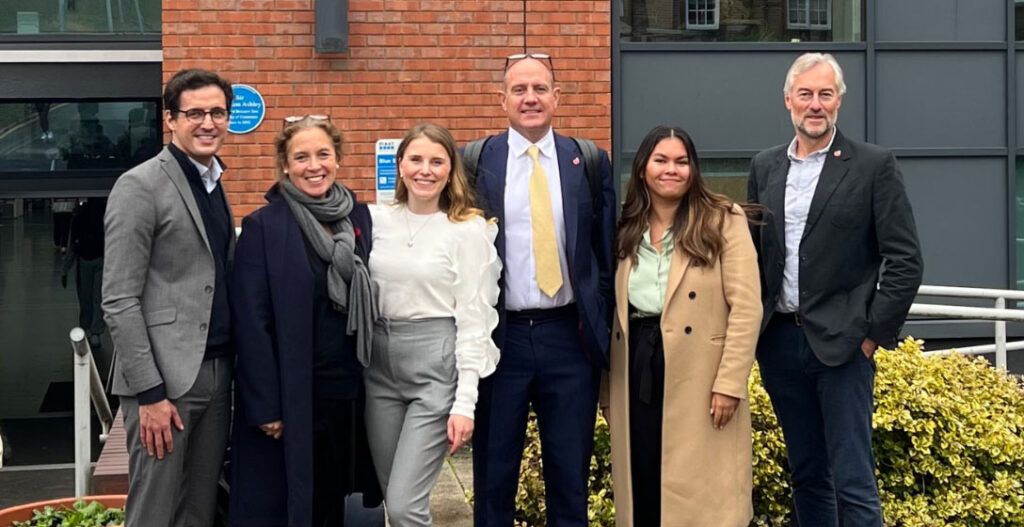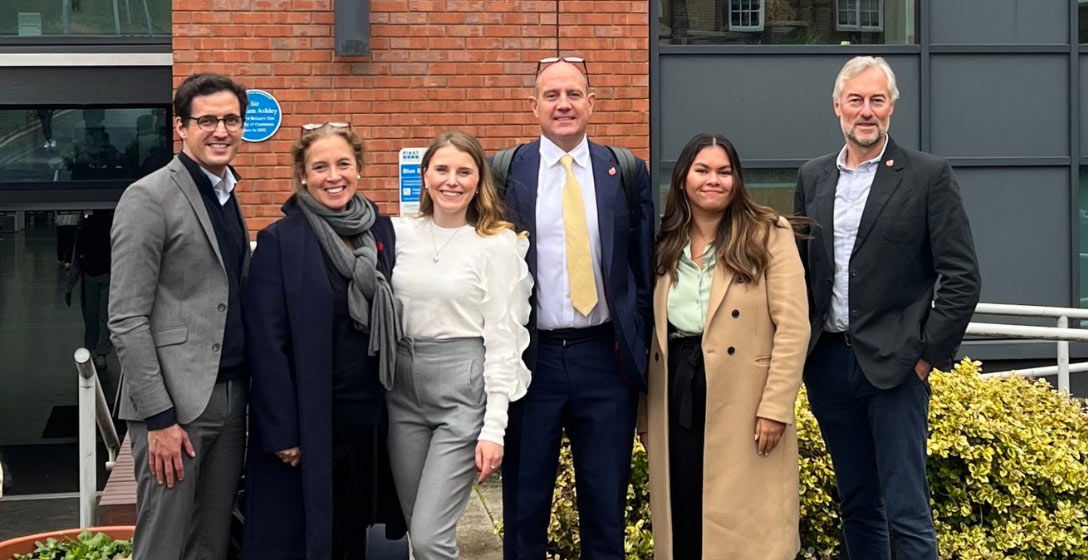
As part of our worldwide events series, K2 recently hosted the Autumn Midlands Global Mobility Forum. Held at Birmingham University’s Business School, the morning event brought together global mobility and HR professionals from around the Midlands area and gave them the opportunity to connect, knowledge-share, and learn about a range of key mobility topics.
Facilitated by K2’s Executive Business Director, Richard Rutledge, attendees enjoyed a number of interactive workshops and discussions, delivered by our panel of subject matter experts and guest speakers.
During the event, attendees learnt more about approaching sustainability mindset change in mobility, and our crucial partnership with Bath University. EY covered the latest tax and social security updates, and the forum closed with a special workshop and personal account from Ben Pearson, supported by the Matt Hampson Foundation, around the importance of perspective change and championing DE&I in the workplace.
Key takeaways
Below, you will find the key learnings from the event and insights from our experts…
Sustainable partnerships with Bath University
K2’s partnership with Bath University has been established with the aim of covering three main areas during the partnership period: materials, life-cycle analysis and behavioural change.
- The material aspect of the partnership looks at finding alternatives to traditional packaging – e.g. reusable, recyclable materials. The carbon emissions of this will also be tested (scope 1, 2 & 3 emissions).
- The behavioural area of the partnership will help drive adoption within the industry, aiming to identify areas in which behavioural change in global mobility is needed.
- A pilot secondment has already begun, with K2’s 6-month internship student collecting data and studying both industry and academic literature to see what market research has already been conducted to identify behavioural changes towards sustainable practices.
Nudge Theory
What are nudges? This is the science behind different techniques to initiate a change in behaviour.
- Nudges work effectively in areas where you would like to influence behaviour without initiating mandates.
- It means choices are not removed and employees can still choose between various options with no introduction of financial incentives.
- Easy to implement through changing choice architecture (the ways in which individuals make their choices).
We explored three different types of nudges:
- Opt-in and opt-out nudges: this method won a Nobel prize for behavioural economics and has been implemented across organ donation (you must now opt-out if you no longer wish to be an organ donor). This has also been tested successfully with pensions but has been seen to be less popular when introduced for reducing carbon offsets.
- Social comparison: this is based on what other people in society are doing – for example, energy usage or lockdown compliance. This is about tailoring messaging so you can drive people to comply.
- Education: these must be simple and effective with economic savings, such as eco-labels and information provisions.
We can use nudges when thinking about a decision making during the relocation process, for example, which nudges can be used to influence behaviour throughout the move?
Economic vs Marketing view
- Economics (traditional view): consumers are fully rational decision makers who carefully weigh out pros and cons.
- Marketing/ consumer psychology: consumers are (partly) emotional decision makers, whose decisions are influenced by a multitude of (irrational) factors.
As the average adult makes over 35,000 decisions per day, we have strategies to manage these workloads such as automatic behaviours, status quo, following the crowd and avoiding information or going with impulses.
You can learn more about our ongoing partnership with Bath University here.
Tax and social security with EY
The ’60-day rule’
- The ’60-day rule’ for business travellers is now used to determine whether somebody is a short-term business visitor into the UK – to qualify they must be in the UK for fewer than 60-days in any 12-month period.
- HMRC allow employers of short-term business travellers that meet the 60-day rule to have relaxed or nil PAYE requirements if certain conditions are met.
- Non-treaty countries can’t apply for short-term business visa exemption and there are certain other circumstances whereby the ’60-day’ rule will not apply.
International Remote Working
With an increased demand for remote working, organisations must consider how to take this forward.
Why look at cross-border remote working policies?
- The Covid-19 crisis has transformed how businesses operate – policies now need to be updated to introduce remote working.
- EY – “trends that we would have expected to play out over 10 years are now happening in 10 days.”
- This brings with it a set of challenges and opportunities which require both protective, controlled responses and enabling, transformational responses.
Key individual tax and regulatory challenges
Employees may trigger tax residence and associated income tax obligations by working in another jurisdiction. Employers also need to consider domestic regulations and laws applicable to cross-border remote workers.
- Tax residence status: potential risks to working arrangements to dual taxation. An infrastructure is needed to mitigate double taxation.
- Social security: working patterns must be taken into consideration to ensure individuals are not going over working thresholds.
- Payroll obligations: broader employer compliance, e.g. corporate tax residency.
- Employment tax compliance: is the employment income is taxable in a remote location and are there subsequent employer requirements?
- Employment law: looking at individual legal requirements in their jurisdictions, does it fall in line with an employee’s contract (e.g., leave entitlement, overtime etc.)
- Industry and professional regulatory requirements – varying local and legal frameworks of industry standards, does this then impact the worker?
- Costs: additional costs, potential social security situations, and is additional compliance effort required?
Post-Brexit – social security implications
Following Brexit, there are some new social security co-ordination rules to take into consideration, such as a geographical cover change and new posting provisions. The key issues relating to the new rules are:
- Managing increased complexity
- Program impact management
- Revised processes
For further information relating to the topics covered in EY’s update, please reach out to our events team for the full slide deck: events@k2corporatemobility.com
Setting your own PACE with the Matt Hampson Foundation
The interactive session begun with an activity between participants, whereby each group had to quickly pass a tennis ball between each of them once, but unknown to our participants, one group had one tennis ball and the other had three.
Thoughts following the activity:
- After a comparison of timings between our group and primary school children, each group became more effective at this, with the facilitators driving enthusiasm to find a more efficient solution.
- The realisation that not everyone is at the same advantage level, some naturally have a disadvantage (one ball vs three).
- Regrouping on feelings during the game: competitiveness, effectiveness, and teamwork.
Key messages
- Purpose: why finding purpose in life is so important, focusing on who we are, and not what we are (limited by injury, personal circumstance etc.)
- Attention: using the example of silver medallists, they should appreciate what they’ve achieved, rather than what they’ve missed out on (a gold medal). We need to shift our view and attention to leverage our purpose.
- Challenge: challenge your thoughts and shift your mindset from unhelpful thoughts to helpful ones.
- Evolve: adapt and become comfortable with being uncomfortable – overcome negative thoughts by challenging them.
Why is DE&I in the workplace so important?
A diverse and inclusive culture attracts and retains talent. This has also been proven to increase productivity, innovation, and performance at work, and is an attractive prospect to clients.
If you would like to learn more about the Matt Hampson Foundation and their inspiring work with rehabilitating those impacted by life-changing injuries, please visit their website here.
What’s next?
We are already looking ahead to the next Midlands Global Mobility Forum, which will take place in Spring 2023.
If you are interested in attending this session and connecting with likeminded professionals, or would like further information on our worldwide series of global mobility events, please contact our events team: events@k2corporatemobility.com

